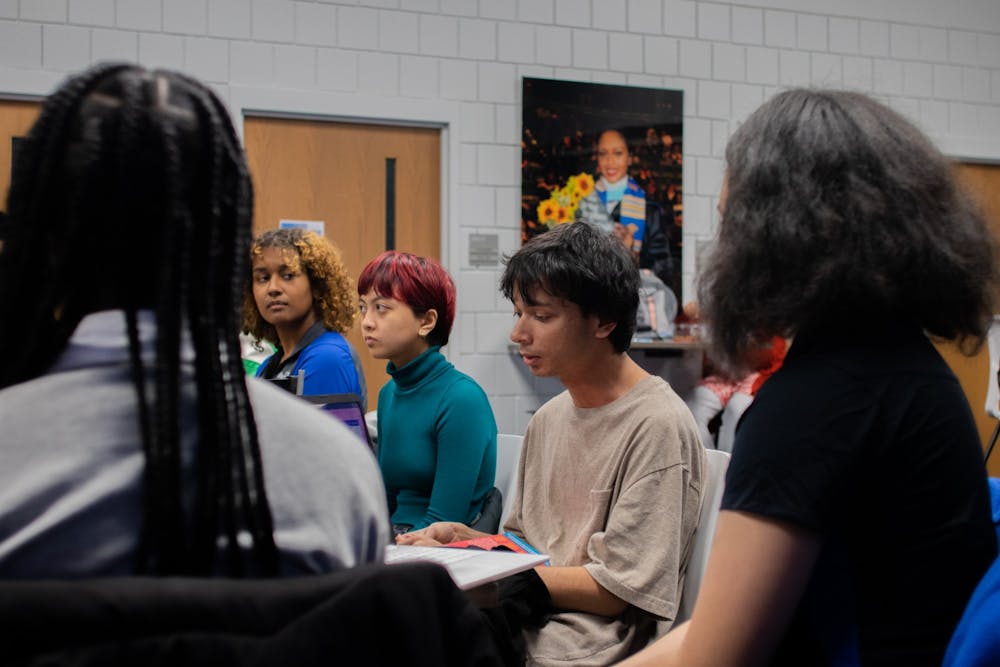The event, “Tough Topics: The Pushback of Black History Month,” started out with a quiz entitled “Black Facts.” Students were given a list of products and brands, and were asked to select which ones they thought a Black person contributed to the creation of. Options included the home security system, the telegraph system, caller ID, Hulu, web animation and the three-light traffic system. As they filled out the quiz, music from a “Black History Month 2023” playlist rhythmically filled the room.
Students waited to see their scores. The result: Every one of the products and brands on the list had a Black creator.
The quiz kicked off the first event in the Tough Topics Program last Tuesday in Student Union 240. It’s part of a series hosted by UB’s Intercultural and Diversity Center (IDC) throughout February in light of Black History Month (BHM). The center’s mission is to celebrate, educate and advocate for students. The program, run by student leaders, encourages students to have tough conversations about current topics surrounding various communities.
“I hope it [the event] brings perspectives,” Zamira Caldwell, a senior biological sciences major and Diversity Advocate for the IDC, said. “I feel like at UB it can be difficult to find your space, so when people feel comfortable coming back to this space after we did a Tough Topics, I feel like that’s a job well done.”
The first event focused on the origins and importance of BHM, the importance of different identities in the Black community, recent controversy around Critical Race Theory (CRT) and the banning of AP African American Studies in Florida.
Students sat at an open-ended conference table in front of a large projector screen, exchanging friendly smiles and waiting to dive into discussions.
A pre-discussion slideshow covered the definition of CRT (“an academic and legal framework… which conveys systemic racism is a part of American society”) and was followed by a video about the creation of Black History Month by Carter G. Woodson in 1926 as “Negro History Week.” The Association for the Study of African American Life and History, the organization Woodson founded, expanded the week to a month in 1976. It was recognized by President Gerald Ford that year and by Congress in 1986.
The video concluded in the present day; there are no federal requirements to teach BHM in schools and, on average, less than 9% of history class is spent on Black history. In some states, the subject is nonexistent.
“Does the education system do Black History justice?” appeared on the screen. Students sparked up passionate and open conversations about their own experiences in their former school years, expressing frustration with the lack of time spent on Black history compared to other subjects in the curriculum.
“If people feel comfortable challenging ideas in this space, asking questions, that’s a job well done to me,” Caldwell said.
Many discussions eventually arrived at the banning of AP African American Studies in Florida and the College Board’s subsequent decision to strike CRT from the course..
After about 35 minutes of discussion, event organizers played a video about Florida Gov. Ron DeSantis’ decision to block AP African American Studies from being taught in public schools. DeSantis said the curriculum “lacks educational value.”
The Florida Department of Education (FDOE) lists six concerns in the course’s curriculum: intersectionality, Black Queer Studies, Movements for Black Lives, Black Feminist Library Thought, the Reparations Movement, and Black Study and the Black Struggle in the 21st Century.
Most students felt that Florida’s ban and the College Board’s decision to strike CRT from the class are erasing Black history. Participants then discussed how the six subjects that are of concern to the FDOE are integral to Black history and to telling the stories of other minority groups within the Black community, like women and LGBTQ people.
Some students participating in these events may not know the definitions of terms discussed by student leaders. Sometimes Caldwell is new to the material too.
“A lot of the time we [student leaders] have to set the context, and I feel like there’s so much value but also so much pressure to do that,” Caldwell said.
The student leaders emphasize the importance of cross-cultural dialogue as a way of further understanding and learning about these topics.
Another video shown by organizers covered the conservative-led movement to ban certain books in school libraries, including “The Story of Ruby Bridges,” a book about the first Black student to desegregate a New Orleans school in 1960. A parent interviewed in Williamson County, Tennessee claims that the book is “divisive and racially charged” and that it “gives white children a negative self-image.”
“Why is her [Bridges’] experience discounted and your white child’s experience more valuable?” another woman quoted in the video said. “That’s unfair.”
The students discussed what these bans will mean for both Black students and students in general — depriving them of historical context, education and different perspectives.
“The Pushback of Black History Month” was just one of four “Tough Topics” discussions the IDC will be hosting this February.
Caldwell’s favorite part of hosting these events is her love for the community.
“I’m centered around finding community,” she said. “I call myself a community builder.”
Caldwell and her fellow Diversity Advocates will continue to lead these upcoming events.
“I feel like attending Tough Topics really made me gain confidence on campus to be a student leader,” she said. “I always hope that it positively influences and impacts other peoples’ lives too.”
The events, held in Student Union 240 and online, are “Is Black Love Under Attack?” on Feb. 14, “The Importance of Intersectionality of the Black Community” on Feb. 21, and “The Destruction of Black Affirmations” on Feb. 28, all going from 3:30 p.m. to 4:45 p.m.
Katie Skoog is an assistant features editor and can be reached at katie.skoog@ubspectrum.com





